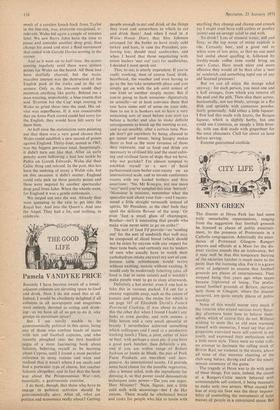CITY LIFE BENNY GREEN
The disaster at Ibrox Park has had some truly remarkable repercussions, ranging from the suggestion that football grounds be licensed as places of public entertain- ment, to the presence of Protestants in a Catholic congregation. Admittedly the atten- dance of Protestant Glasgow Rangers players and officials at a Mass for the dis- aster victims sounds like an irrelevancy, but it may well be that this temporary burying of the sectarian hatchet is much more to the point than the licensing idea. For it is a grave error of judgment to assume that football grounds are places of entertainment. They stopped being that years ago when teams became frightened of losing. The profes- sional football grounds of Britain, particu- larly those in Glasgow, where the disaster occurred, are quite simply places of public worship.
None of this would matter very much if the votaries who attend services every Satur- day afternoon knew how to behave them- selves, which of course they do not. Without wishing to seem like an old man warming himself with memories, I must say that con- gregations exercised more self-control in my youth, and expressed their enthusiasm with a little more style. There were no toilet rolls, no attempt to decimate the rolling stock of -British Rail, no violence in the streets, above all none of that moronic chanting of the club song before, during and after the ninety minute ceremony of the game.
The tragedy at Ibrox was to do with none of these things. For once, indeed, the crowd at a Rangers-Celtic match behaved with commendable self-control, it being necessary to make only two arrests. What caused the loss of sixty-six lives was the sheer impossi- bility of controlling the movements of large masses,of,people in, a constricted space. But
even though it is impossible, there are all kinds of improvements that could be made, and it is shameful that it should take the Ibrox holocaust to remind us that this is so.
For a while there will be much pietistic talk about modernising our football grounds, which is about as sensible as talking about modernising the Tower of London. Go down to Dockland and stand outside the home of the Millwall club. Or take a bus-ride from the West End of London, across the river, over Blackheath to Charlton Athletic's ground. Go to Upton Park and take a good look at West Ham United's home. Or, if you think I am stacking the cards, examine closely the so-called luxury grounds, at Highbury, White Hart Lane and Stamford Bridge. And when you have completed this tour, pour yourself a stiff drink and ask Yourself where you begin modernising. The truth is that professional football, one of this country's major industries and tourist attractions, is using stock so old that nobody today can remember when it was first in- troduced. The first time I watched a game in Wembley Stadium I could not quite put my finger on its uniqueness. Later it dawned on me. It was simply that. Wembley had been built after the first world war.
When the recommendations for ground improvements come, there will be much clasping of directorial hearts and hollering to High heaven about the cost. The Football League will probably take its traditional line, which is that the suggestions, even if vitally necessary to public safety, cannot be acted upon because the cost would eliminate half the teams in the Football League, to which I say, 'Go on and eliminate them, and see if anybody notices.'
As this is an issue which affects virtually every sizeable city in Britain, it is stupefying that the years go by and nothing is ever done. Of all the many millions of pounds paid into the turnstiles in the last sixty years, how much have the clubs spent on civilised lavatories, or cafeterias which are recog- nisably cafeterias? Which club has ever thought of allowing all its paying customers the privilege of a seat? Which club has ever thought of employing a modern architect to design entrances and exits which would minimise the kind of disaster which hit Ibrox the other day? The administrators of British football still think, when they open their gates to the public, that they are bestowing largesse on the Victorian poor, and if the behaviour of the crowds sometimes corro- borates that attitude, it is no excuse for the behaviour of the administrators. There is a Poetic justice in these things, and no doubt if football clubs persist in ignoring the facts, their support will one day drift away.
And after all, it would be a pity if the structure of professional football in Britain Were to collapse just because nobody had the courage to renovate its bricks and mor- tar. The existence of a winning team in a town can galvanise even those who take no direct interest. I was once sent to report a Match at Peterborough, when that town's civic pride at having finally won entry to the football League was still rampant. On arriv- ing at the station there was no need for me to ask the way to the ground. Every road seemed to have been magnetised with foot- ball as its end. And in the days when, under Raich Carter's player-management, Hull City enjoyed a brief hour as a major foot- ball power, it was found that productivity in the local factories had risen by 2 per cent. "1 his should surprise nobody who recognises that religious gratification of any kind will have the.most tangible-effects'on people.'"






































 Previous page
Previous page